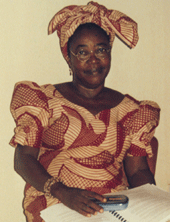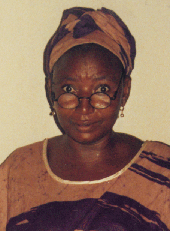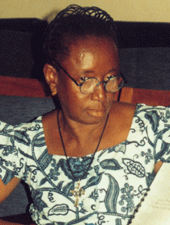
Glasses for Midwives
At Work They Are My Second Eyes
“The eyeglasses have helped me to read my [self-paced learning] units
without problems, especially at night. At work they are my second eyes... work
goes on as normal unlike before. I am so happy because the glasses have
improved my sight.”
A midwifery superintendent at Yendi Hospital in the Northern region of
Ghana, Beatrice Billa is one of 50 health care workers who are seeing more
clearly thanks to a recent collaboration between the PRIME II Project and Helen Keller International (HKI).
At a meeting just before the start-up of PRIME’s self-paced learning
program in safe motherhood skills for Ghanaian midwives, the Regional Resource
Teams responsible for selecting trainees noted that many of the midwives
appeared to need glasses. Some of the midwives themselves had requested that
new curriculum and training materials be made available in Reader’s Digest-style large-print versions to reduce eye strain.
The cause of the midwives’ poor eyesight was presbyopia, a common
condition affecting people over 40, in which the eyes gradually lose the
capacity to focus on objects up close. While some midwives had been able to
seek care and purchase glasses, others could not afford to do so. Concerned
that eye strain might decrease their motivation and ability to successfully
follow the self-paced learning activities, PRIME’s midwifery advisor pledged to find a way to supply reading glasses to all of the participants in need.
Inspired by this pledge, another PRIME staff member contacted HKI, a
division of Helen Keller Worldwide that directly addresses the causes of
preventable blindness in more than 20 developing countries, and also provides
rehabilitation services to the blind. HKI’s answer to PRIME’s request was a resounding yes: within a few weeks, a donation of 50 pairs of reading glasses had been dispatched to Ghana for distribution by the PRIME team to trainees who had new prescriptions for glasses or whose glasses needed replacing.
Like Beatrice Billa, many of the midwives are finding their improved vision
beneficial on the job as well as in completing their learning assignments.
“The spectacles have helped me in reading my units and also in carrying
out my work, like when suturing episiotomy wounds and setting up drips at
night when I normally would not see clearly,” says Lardi Moro, Senior Community Health Nurse-Midwife at the Bumbonayilli Health Centre in Northern region.
The collaboration with HKI to meet the midwives’ need for glasses
reinforces PRIME II’s experience that non-training as well as training
interventions are often required to solve performance problems or ensure that
training is effective. Enabling the midwives to read without strain--and
improving their daily lives and work in the process--enhances the chances of
success for the self-paced learning program, which focuses on integrated safe
motherhood services including life-saving skills, postabortion care and family
planning. The program is a component of PRIME’s ongoing technical assistance to the Ghana Ministry of Health in an effort to establish quality safe motherhood services at the primary level.
The PRIME II Project works around the world to strengthen the performance of primary-care providers as they strive to improve family planning and reproductive health services in their communities.
PRIME Voices #13, New Eyeglasses for Ghana Midwives, 9/25/02.
Photo credits: Ghana Photos, Tamale, Northern Region; Silas Adams, One Flash Photo and Business Centre, Wa, Upper West Region
|













